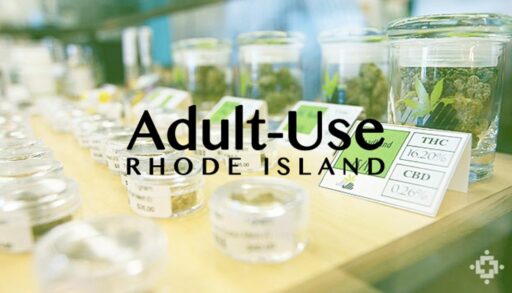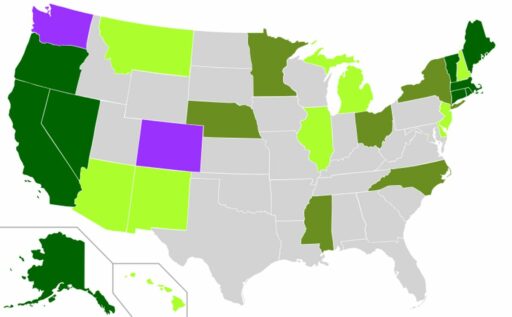In 2018, Missouri took a significant step in transforming its approach to cannabis by legalizing medical marijuana, setting the stage for a dynamic and evolving legal landscape. As we explore the state’s journey from prohibition to legalization, it’s crucial to understand the intricacies of the laws, the operational challenges for businesses, and the broader context of the regional cannabis market. This article delves into the key aspects of Missouri’s marijuana laws, offering insights into compliance, industry competition, consumer safety, and the importance of community engagement.
Key Takeaways
- Missouri legalized medical marijuana in 2018 and recreational cannabis in 2022, benefiting from observing other states’ regulatory frameworks.
- The state has implemented stringent testing and labeling regulations to ensure consumer safety and maintain regulatory oversight.
- Competition and collaboration with neighboring states, like Illinois, are shaping Missouri’s cannabis market dynamics.
- Consumer protection is a top priority, with strict labeling laws and regulatory measures to address unregulated THC products.
- Community engagement and education are pivotal, with initiatives like the Missouri Stakeholder Summit fostering industry innovation and responsible practices.
The Evolution of Missouri’s Marijuana Laws

Historical Milestones: From Prohibition to Legalization
The journey of marijuana laws in Missouri has been marked by significant shifts, reflecting a broader national trend towards acceptance and regulation. Missouri’s path from prohibition to legalization is a microcosm of the changing attitudes towards cannabis in the United States.
- In the early 20th century, Missouri, like many states, enforced strict prohibition laws against marijuana.
- The turn of the millennium saw a gradual softening of views, with increased advocacy for medical marijuana leading to legislative changes.
- By 2018, Missouri had joined the ranks of states with legalized medical marijuana, setting the stage for future discussions on recreational use.
The evolution of these laws not only mirrors societal changes but also sets the foundation for a burgeoning cannabis industry within the state. The implications for business, healthcare, and law enforcement are profound, as Missouri navigates the complexities of this new legal landscape.
Medical vs. Recreational Use: Understanding the Distinctions
In Missouri, the distinctions between medical and recreational marijuana are significant, both in terms of legal status and the implications for consumers and businesses. Medical marijuana is available to patients with qualifying conditions, while recreational use remains illegal as of 2018. This creates a clear divide in access and regulation.
- Medical marijuana requires a physician’s certification and a state-issued patient ID card.
- Recreational use, if it were to be legalized, would be available to adults over a certain age without the need for medical justification.
The regulatory framework for medical marijuana is designed to ensure that patients have safe and legal access to cannabis for therapeutic purposes.
Businesses operating in the medical cannabis market must navigate a complex landscape of compliance, from product testing to secure handling. Understanding these distinctions is crucial for anyone looking to participate in Missouri’s cannabis industry.
Recent Amendments and Voter Initiatives
Missouri’s journey towards marijuana reform reached a pivotal moment in 2022 with several key voter initiatives shaping the landscape. Voters decisively passed measures to legalize adult-use marijuana, reflecting a significant shift in public opinion and policy. This change not only alters the legal status of cannabis but also introduces new complexities in regulation and enforcement.
- Yes – Criminal justice reforms: Offers expungement provisions.
- No – Social equity provisions
- No – Employment protections
- Yes – Home grow
The absence of social equity provisions and employment protections in the recent amendments has sparked discussions on the inclusivity and fairness of the new laws. The approval of home cultivation, however, marks a win for personal liberties and access.
The 2022 ballot initiatives represent a transformative phase in Missouri’s approach to marijuana policy, setting a precedent for future legislative developments.
Compliance and Business Operations in the Missouri Cannabis Market

Opening a Dispensary: Steps and Requirements
Opening a dispensary in Missouri involves a series of critical steps to ensure compliance with state regulations and successful entry into the market. Securing the appropriate licenses is the first and most crucial step.
- Research Missouri’s specific cannabis laws and regulations.
- Develop a comprehensive business plan.
- Secure a suitable location that complies with zoning laws.
- Apply for and obtain the necessary state and local licenses.
- Establish a robust security system to protect your inventory and customers.
- Hire knowledgeable staff and provide adequate training.
It’s essential to stay updated with the ever-evolving cannabis laws and regulations to maintain compliance and operate effectively.
Each step requires careful planning and attention to detail. From choosing a location to navigating the complexities of the application process, prospective dispensary owners must be diligent in their approach. The Missouri cannabis market offers significant opportunities, but only to those who can navigate the regulatory landscape successfully.
Navigating Stringent Testing and Labeling Regulations
In the landscape of Missouri’s cannabis industry, compliance with testing and labeling regulations is paramount. Missouri’s labeling laws demand meticulous attention to detail, with a mandated sequence of information on cannabis packaging. This includes the state’s THC logo, a list of all ingredients, the producer’s license number, the location of product testing, track-and-trace numbers, and THC potency.
Missouri stands out for its rigorous testing protocols, which extend to all cannabis products, including pre-rolls. The state’s law stipulates testing for a comprehensive list of substances and contaminants:
- Moisture Content and water activity
- Residual solvents and processing chemicals
- Residual pesticides
- Microbial impurities
- Mycotoxins
- Foreign materials
- Heavy metals (arsenic, cadmium, lead, mercury, and chromium)
- Cannabinoids
- Terpenes (upon request)
With one of the industry’s most stringent testing regimens, Missouri requires that every component of the cannabis product, down to the rolling paper, meets the established safety standards. A failure in any category can result in the destruction of the entire product lot.
The state has certified only 10 labs to conduct these tests, ensuring a high level of scrutiny and quality control. This certification process is part of Missouri’s efforts to prevent ‘lab shopping’—a practice where producers seek out labs with lenient testing to pass their products. The state’s approach to lab licensing is designed to uphold the integrity of the cannabis market and protect consumer safety.
Understanding Lab Licensing and the Impact of Lab Shopping
In Missouri, the approach to lab licensing is stringent, with detailed requirements for who can conduct cannabis testing. Labs must employ a director with significant experience in a regulated lab environment and testers with a natural science background. This ensures a high standard of reliability and accuracy in cannabis testing.
To combat the practice of lab shopping, where producers seek favorable test results by choosing lenient labs, Missouri has implemented robust measures. Producers and labs are now mandated to cross-submit samples for comparative analysis, a move designed to maintain consistency and integrity in test results.
Missouri’s proactive stance on lab licensing and its efforts to curb lab shopping reflect a commitment to consumer safety and product reliability.
The state’s vigilance is evident in its periodic requirement for inter-lab testing, where labs are randomly selected to exchange samples and verify results. This not only deters the inflation of THC potency figures but also ensures that pesticide residue tests are uniformly stringent across all labs.
Missouri’s Cannabis Industry in the Regional Context

Comparative Analysis: Missouri vs. Illinois
The cannabis markets in Missouri and Illinois present a fascinating case study in regional industry dynamics. Missouri’s recent entry into the cannabis space has allowed it to learn from the experiences of its neighbors, tailoring its regulations to avoid past pitfalls. For instance, Missouri’s stringent testing requirements underscore its commitment to consumer safety, earning it the moniker ‘the Show Me State’ in the cannabis context.
In contrast, Illinois, which has had a more established market, faces unique challenges such as higher recreational cannabis prices. This disparity in pricing can be attributed to various factors, including taxes and supply chain differences. A comparative analysis reveals that while both states aim to foster a thriving cannabis industry, their approaches and market characteristics differ significantly.
The evolving landscape of cannabis laws and market forces in Missouri and Illinois highlights the importance of adaptive regulatory frameworks that can respond to the needs of businesses and consumers alike.
The table below succinctly captures some of the key differences between the two states’ cannabis markets:
| Aspect | Missouri | Illinois |
|---|---|---|
| Market Entry | Medical (2018), Recreational (2022) | Earlier market establishment |
| Testing Regulations | Extensive testing requirements | Standard testing protocols |
| Price Disparities | Lower prices compared to Illinois | Higher recreational cannabis prices |
| Regulatory Approach | Learning from other states | Pioneering in the region |
The Influence of Emerging Markets in Neighboring States
The cannabis industry in Missouri is not an isolated phenomenon; it is significantly influenced by the emerging markets in neighboring states. As Missouri continues to develop its own cannabis market, it’s essential to consider the broader regional landscape. States like Illinois have already established a flourishing adult-use market, setting a competitive standard in terms of product variety and regulatory frameworks.
In contrast, states such as Kansas and Kentucky are still shaping their stance on cannabis legalization. The ripple effects of Missouri’s legalization are felt across state lines, with implications for law enforcement and market dynamics. For instance, after Missouri’s move towards legalization, there has been a noticeable shift in cannabis-related arrests in Kansas.
- Missouri: Booming market with close regulatory oversight
- Illinois: Thriving adult-use market with diverse product offerings
- Kansas: Adjusting law enforcement in response to neighboring legalization
- Kentucky: Struggling with legalization efforts and maintaining strict penalties
The interplay between Missouri and its neighbors is a complex tapestry of competition and collaboration, with each state’s decisions influencing the others in profound ways.
Interstate Competition and Collaboration
As the cannabis industry matures, states like Missouri and Illinois are finding themselves in a dynamic rivalry. Missouri’s strategic moves in the market are not just about internal growth but also about positioning against its neighbors. This competition is not only about market share but also about becoming a hub for innovation and setting industry standards.
In the context of interstate commerce, collaboration can sometimes be as crucial as competition. States are beginning to recognize the benefits of sharing best practices and harmonizing regulations to facilitate a more cohesive regional market. Such efforts can lead to a more streamlined experience for businesses and consumers alike, fostering a healthier industry overall.
The evolving landscape of the cannabis industry in the Midwest is a testament to the agility and responsiveness of states to the needs of the market and their constituents.
While competition drives growth, it is the collaborative spirit that will likely pave the way for sustainable success in the cannabis sector.
Consumer Safety and Regulatory Oversight

The Role of Regulators in Ensuring Public Health
In the realm of cannabis regulation, the role of regulators is pivotal in safeguarding public health. Ensuring that cannabis products are safe and properly labeled is a cornerstone of their responsibilities. A harmonized symbol for cannabis products, agreed upon by regulators, could significantly reduce public health risks by allowing for rapid and accurate product identification.
Regulatory oversight extends to the enforcement of testing protocols. For instance, Missouri’s new regulations mandate inter-laboratory testing consistency checks. Up to ten times per year, one lab may be required to retest samples from another lab to verify potency results and pesticide residue compliance.
The complexity of cannabis regulation is underscored by the need to balance consumer safety with industry growth. Regulators must navigate federal and state laws, implement evidence-based practices, and engage with community and industry stakeholders to foster a responsible cannabis market.
The following list outlines key steps and considerations for regulators in Missouri:
- Creating a symbol of best practices in cannabis regulatory standards
- Ensuring inter-laboratory testing consistency
- Reviewing and updating safety and security-sensitive industry regulations
- Providing clear guidance on avoiding legal issues
- Engaging in community outreach and education
Addressing the Challenges of Unregulated THC Products
The cannabis industry’s rapid growth has brought to light the issue of unregulated THC products, which pose significant challenges to consumer safety and regulatory compliance. The heart of the argument is whether Delta Extraction violated state law by selling THC concentrate derived from out-of-state hemp. This concern is not just about legal technicalities but also about the safety of medical market consumers and low-dose patients.
Missouri’s recent hearings have highlighted the complexities of regulating THC products, especially those derived from hemp. State officials have clarified that THC-A, a type of THC, has never been part of a regulatory loophole, emphasizing that all forms of hemp-derived THC are federally legal yet unregulated. The focus on THC potency inflation is not only a sales driver but also a public health concern.
The commitment to public health and safety is paramount, and regulators are tasked with the protection of patients and consumers from unlicensed and unregulated THC products.
The final rules have outlawed certain practices, but the enforcement and oversight remain challenging. Companies like Delta have been at the center of this debate, with state officials testifying about the legality and regulation of their products. The industry must navigate these complexities to ensure compliance and maintain consumer trust.
The Importance of Accurate Product Labeling for Consumer Protection
In the realm of Missouri’s cannabis industry, accurate product labeling is not just a legal requirement; it’s a cornerstone of consumer safety. The state’s stringent testing requirements mandate that all cannabis products, including pre-rolls, be tested in their final form. This ensures that consumers are protected from potential contaminants and are provided with reliable information regarding THC potency and other critical product details.
Missouri’s regulations are particularly focused on preventing THC potency inflation, a practice that not only misleads consumers but can also pose safety concerns, especially for medical patients or those preferring low-dose options. To comply with these regulations, manufacturers must be vigilant in selecting suppliers, as even rolling papers can cause products to fail testing if they contain harmful substances.
The emphasis on comprehensive testing extends to aspects such as moisture content and water activity, which are indicators of mold growth potential. Missouri’s standards are designed to prevent the sale of products that could harm consumers due to mold or other contaminants.
The consequences of non-compliance can be severe, including product recalls that can tarnish a company’s reputation and financial stability. It is imperative for businesses to invest in quality control and ensure that every product reaching the market adheres to the highest safety standards.
Engagement and Education: Building a Responsible Cannabis Community

The Missouri Stakeholder Summit: A Forum for Change
The Missouri Stakeholder Summit is a pivotal event for those involved in the state’s cannabis industry. This summit, hosted by the National Cannabis Industry Association (NCIA), is a crucial platform for industry leaders, policymakers, and stakeholders to convene and discuss the pressing issues shaping Missouri’s cannabis landscape.
During the summit, attendees can expect a wide range of programming including interactive panel discussions, intimate fireside chats, and live Q&A sessions. These events are designed to amplify the Voice of Main Street Cannabis and ensure that key decision-makers hear the concerns and suggestions of those at the forefront of the industry.
The summit is not just a meeting place but a beacon for progress, offering a chance to be part of the conversation that drives change and innovation in Missouri’s cannabis industry.
For those looking to make an impact, the summit provides invaluable networking opportunities, expert panels, and discussions tailored to meet the needs of both seasoned professionals and newcomers. It’s an essential opportunity to connect with like-minded individuals, gain strategic knowledge, and contribute to the growth of Missouri’s cannabis market.
Educational Resources and Community Outreach
In the wake of evolving marijuana laws, Missouri has seen a surge in the need for comprehensive educational resources and community outreach programs. Educational initiatives are crucial in promoting responsible consumption and understanding of the legal landscape.
Community outreach efforts have been tailored to address the diverse needs of Missouri’s population. These include:
- Disaster Responder Stress Management programs
- Engage, Educate, Empower for Equity (E4) initiatives
- GAINS Center resources for behavioral health
- Early Serious Mental Illness Treatment Locator services
- Faith and Community Engagement projects
The success of these programs hinges on their ability to adapt to the changing legal and social environment, ensuring that all community members have access to accurate and helpful information.
These resources not only provide support but also foster a sense of community and shared responsibility. As the industry grows, so does the importance of maintaining an informed public, capable of making safe and legal choices regarding marijuana use.
The Significance of Industry Associations and Advocacy Groups
Industry associations and advocacy groups play a pivotal role in shaping the future of the cannabis industry in Missouri. These organizations provide a platform for stakeholders to collaborate and drive positive change. They offer a range of services and resources that are crucial for the growth and sustainability of the sector.
- Educational Webinars and Summits: These events are essential for keeping industry professionals informed about regulatory updates and market insights.
- Advocacy and Policy Efforts: Groups like NORML are at the forefront of advocating for cannabis freedom and ensuring that consumer interests are represented.
- Membership Benefits: Joining an industry association can provide access to exclusive resources, networking opportunities, and discounts on events.
The synergy between education, advocacy, and community engagement is the cornerstone of a thriving cannabis industry. By fostering an environment of continuous learning and active participation, these groups help to ensure that the industry evolves in a responsible and consumer-friendly manner.
Conclusion
As we’ve explored the evolving landscape of Missouri’s marijuana laws since 2018, it’s clear that the state has made significant strides in both medical and recreational cannabis regulation. From the initial approval of medical marijuana to the landmark legalization of recreational use in 2022, Missouri has demonstrated a commitment to developing a robust and responsible cannabis industry. With stringent testing requirements, strict labeling laws, and a proactive approach to public health and safety, the state sets an example for regulatory best practices. As the industry continues to grow and evolve, staying informed and involved through platforms like the Missouri Stakeholder Summit will be key for businesses and consumers alike to navigate the complexities of the cannabis market. The journey of Missouri’s marijuana laws is a testament to the dynamic nature of policy-making and the importance of community engagement in shaping a safe and thriving cannabis ecosystem.
Frequently Asked Questions
What were the key milestones in the evolution of Missouri’s marijuana laws?
Missouri has seen significant changes in its marijuana laws, with medical marijuana approved by voters in 2018 and recreational cannabis legalized in 2022. The state has been closely monitoring the cannabis industry, ensuring compliance with stringent regulations.
What are the main differences between medical and recreational marijuana use in Missouri?
Medical marijuana is prescribed for patients with qualifying medical conditions, while recreational marijuana is available to adults over the age of 21 for personal use. Both are subject to different regulatory frameworks and tax structures.
How can one open a dispensary in Missouri?
Opening a dispensary in Missouri involves a multi-step process, including obtaining the necessary licenses, complying with state regulations, and ensuring the business meets all testing and labeling requirements.
What are Missouri’s regulations on cannabis testing and labeling?
Missouri has strict laws on cannabis testing and labeling, requiring specific information such as the state’s THC logo, ingredients, license number, test results, and THC potency to be displayed in a precise order on packaging.
How does Missouri’s cannabis industry compare to that of Illinois?
Missouri and Illinois have both developed competitive cannabis markets, but they differ in regulatory approaches, market maturity, and consumer preferences. Missouri has benefited from observing the development of other states’ programs, including Illinois.
What measures are in place to ensure consumer safety and product quality in Missouri?
Regulators in Missouri are committed to public health and safety by overseeing stringent testing requirements, ensuring accurate product labeling, and addressing unregulated THC products to maintain high standards in the cannabis market.





